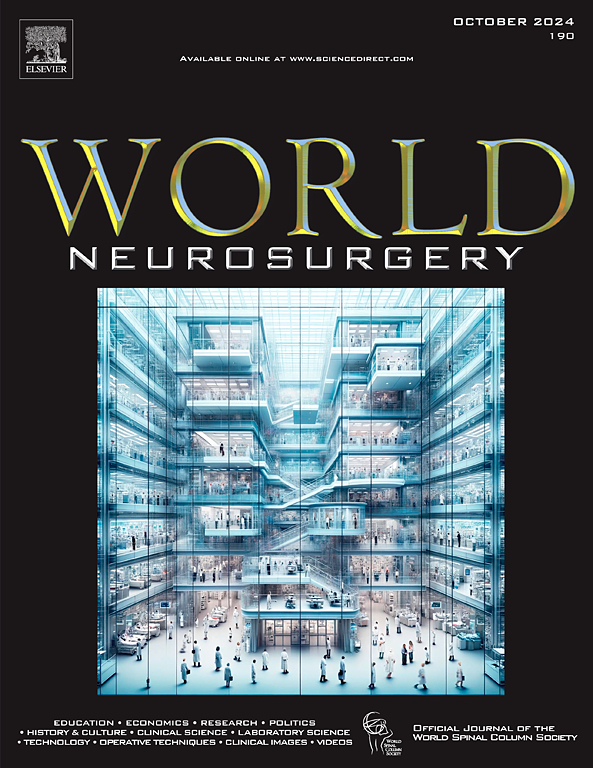Litigation Involving Delay of Spinal Care During the COVID-19 Pandemic: A Review of Reported Legal Cases in the United States
IF 1.9
4区 医学
Q3 CLINICAL NEUROLOGY
引用次数: 0
Abstract
Background
During the coronavirus disease 2019 (COVID-19) pandemic, access to medical care was delayed worldwide. In multiple instances, the pandemic has led to delay in care, suboptimal patient outcomes and litigation. This study was designed to assess the incidence and characteristics of litigation in the United States related to delays in spine care secondary to the COVID-19 pandemic.
Methods
A retrospective review of the legal database LexisNexis following PRISMA guidelines was conducted. LexisNexis was queried for cases, verdicts, and settlements involving a delay of spinal care during the COVID-19 pandemic. Collected data included plaintiffs' demographics and spinal pathology, delay length and reason, legal cause of action, state/region of occurrence, and case outcome.
Results
Thirty-two cases met the criteria for full review. The average reported delay in litigated cases was 5.64 ± 3.83 months, with 25% having not received the necessary spinal care at the time the claim was filed, most of which were in 2022. Most cases involved lumbosacral disease with pain as the predominant symptom (96.88%), followed by neurological deficits (25%). Most cases (62.50%) involved inmates and were based on a claim of cruel and unusual punishment in violation of the 8th Amendment of the U.S. Constitution.
Conclusions
This study provides granular detail about the characteristics of litigation related to delay of spinal care secondary to the COVID-19 pandemic in the United States. Most plaintiffs were inmates who had difficulty obtaining a specialist appointment, imaging, or treatment. In many cases the reason for litigation were unattended requests for simple and low-cost interventions.
COVID-19大流行期间涉及脊柱护理延迟的诉讼:对美国报道的法律案件的回顾
背景:在2019冠状病毒病大流行期间,世界各地的医疗服务获得延迟。这导致了不良的患者治疗结果和诉讼。本研究旨在评估美国与COVID-19大流行继发脊柱护理延误相关的诉讼的发生率和特征。方法:根据PRISMA指南对LexisNexis进行回顾性评价。我们向LexisNexis查询了COVID-19大流行期间涉及脊柱护理延误的病例、判决和和解。收集的数据包括原告的人口统计和脊柱病理、延迟时间和原因、法律诉讼原因、州/地区和案件结果。结果:32例符合全面复查标准。报告的平均延迟时间为5.64±3.83个月,其中25%的人在提出索赔时没有接受必要的脊柱护理,其中大部分是在2022年。大多数病例以腰骶部病变为主要症状(96.88%),其次为神经功能障碍(25%)。大多数案件(62.50%)涉及囚犯,并以违反美国宪法第八修正案的残酷和不寻常的惩罚为依据。结论:本研究提供了与美国COVID-19大流行导致的脊柱护理延迟相关的诉讼特征的详细信息。大多数原告是难以获得专家、成像或治疗的囚犯。其余病例中有很大一部分与无人照料的简单和低成本干预措施请求有关。
本文章由计算机程序翻译,如有差异,请以英文原文为准。
求助全文
约1分钟内获得全文
求助全文
来源期刊

World neurosurgery
CLINICAL NEUROLOGY-SURGERY
CiteScore
3.90
自引率
15.00%
发文量
1765
审稿时长
47 days
期刊介绍:
World Neurosurgery has an open access mirror journal World Neurosurgery: X, sharing the same aims and scope, editorial team, submission system and rigorous peer review.
The journal''s mission is to:
-To provide a first-class international forum and a 2-way conduit for dialogue that is relevant to neurosurgeons and providers who care for neurosurgery patients. The categories of the exchanged information include clinical and basic science, as well as global information that provide social, political, educational, economic, cultural or societal insights and knowledge that are of significance and relevance to worldwide neurosurgery patient care.
-To act as a primary intellectual catalyst for the stimulation of creativity, the creation of new knowledge, and the enhancement of quality neurosurgical care worldwide.
-To provide a forum for communication that enriches the lives of all neurosurgeons and their colleagues; and, in so doing, enriches the lives of their patients.
Topics to be addressed in World Neurosurgery include: EDUCATION, ECONOMICS, RESEARCH, POLITICS, HISTORY, CULTURE, CLINICAL SCIENCE, LABORATORY SCIENCE, TECHNOLOGY, OPERATIVE TECHNIQUES, CLINICAL IMAGES, VIDEOS
 求助内容:
求助内容: 应助结果提醒方式:
应助结果提醒方式:


